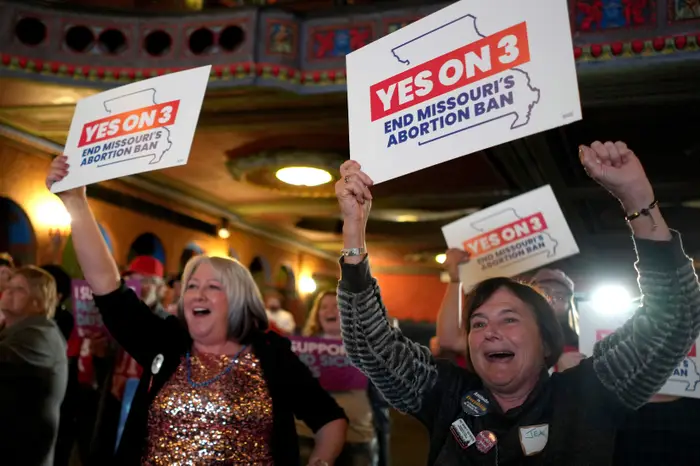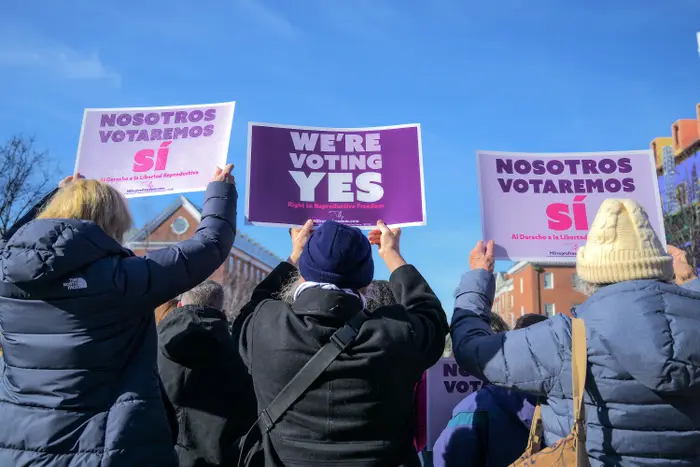Voters Protected Abortion Rights in Majority of States, Overturning a “Deep-Red” State’s Near-Total Ban
In a significant turn of events, voters across the United States demonstrated widespread support for abortion rights in the recent elections. Of the ten states where abortion measures were on the ballot, seven states voted to expand or enshrine abortion access, reinforcing the long-held belief among pro-choice advocates that abortion rights are broadly popular.
Key Outcomes
One of the most notable victories came from Missouri, a deep-red state that voted to codify abortion protections into its state constitution. This measure will effectively repeal the state’s near-total abortion ban, restoring access up to approximately 24 weeks of pregnancy. This landmark decision marks the first time since the fall of Roe v. Wade that voters have successfully overturned an abortion ban with no exceptions for rape or incest.
In Maryland and Colorado, voters supported amendments to enshrine abortion access throughout pregnancy. Colorado’s amendment also repeals a 1984 state law that prohibited the use of public funds for abortion care, making it a progressive win for reproductive rights advocates.

States like Arizona, Montana, and Nevada voted to pass amendments that codify abortion access through fetal viability, allowing abortions up to around 24 weeks into pregnancy. Additionally, New Yorkers approved a historic amendment expanding the state’s equal rights protections to include pregnancy and related outcomes, while also safeguarding against discrimination based on various personal characteristics.
Mixed Results
Despite the successes in seven states, there were notable defeats for abortion rights in Florida, Nebraska, and South Dakota. In Nebraska, a slim majority of voters supported an anti-abortion amendment that codifies the state’s current 12-week abortion ban, defeating a competing abortion rights measure.
Florida’s outcome was particularly disheartening for pro-choice advocates. Although 57% of Floridians supported an amendment to restore abortion access until fetal viability, the measure did not pass due to failing to meet the state’s 60% threshold for constitutional amendments. Lauren Brenzel, director of the “Yes On 4” campaign, expressed frustration over the outcome, highlighting that a minority of voters effectively decided the fate of the amendment.
Implications of the Results

While seven out of ten states voted to protect abortion rights, the elections also saw support for a presidential candidate, Donald Trump, who is likely to push for significant rollbacks in reproductive health care access. Although Trump has been less vocal about his anti-abortion stance during the campaign, experts warn that a second Trump administration could lead to the implementation of a national abortion ban that would override state laws.
Trump’s allies have already outlined plans for Project 2025, which includes strategies for implementing a national abortion ban. Such a ban would invalidate the protections established by the recent state amendments and could potentially enforce archaic laws like the Comstock Act, which prohibits the mailing of abortion pills.
Looking Ahead
As the GOP secured control of the Senate, the balance of power in the House remains uncertain, complicating Trump’s ability to enact a national abortion ban through Congress. Legal challenges are expected in every state that passed abortion rights amendments, as opponents will likely contest the successful initiatives and seek to maintain existing regulations, such as waiting periods and mandatory counseling.
Conclusion
The recent elections have underscored a clear message from voters: abortion rights are widely supported across the nation. However, the ongoing political landscape suggests that the fight for reproductive rights is far from over, with potential threats looming at both the state and federal levels. As advocates prepare for legal battles, the outcome of these elections serves as a reminder of the importance of continued advocacy for reproductive health care access.
Thank you for taking the time to read this article! Your thoughts and feedback are incredibly valuable to me. What do you think about the topics discussed? Please share your insights in the comments section below, as your input helps me create even better content.
I’m also eager to hear your stories! If you have a special experience, a unique story, or interesting anecdotes from your life or surroundings, please send them to me at whatsissue@gmail.com. Your stories could inspire others and add depth to our discussions.
If you enjoyed this post and want to stay updated with more informative and engaging articles, don’t forget to hit the subscribe button! I’m committed to bringing you the latest insights and trends, so stay tuned for upcoming posts.
Wishing you a wonderful day ahead, and I look forward to connecting with you in the comments and reading your stories!
